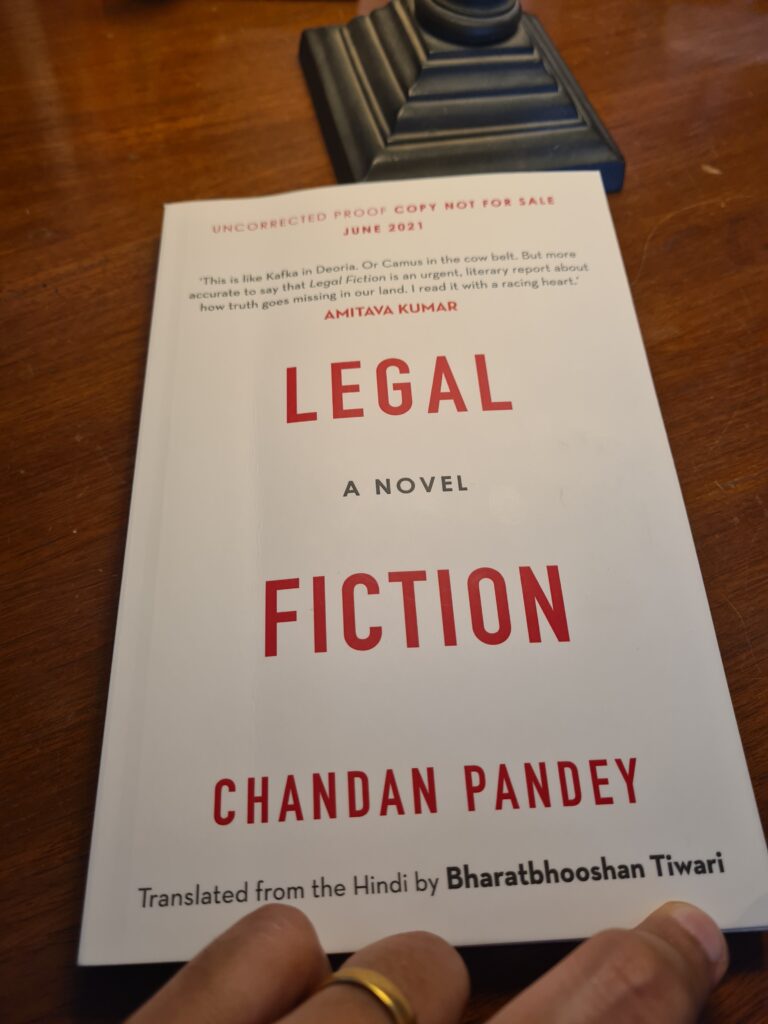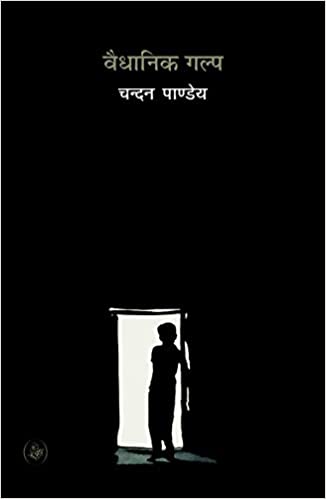“Legal Fiction” by Chandan Pandey

Chandan Pandey’s Legal Fiction, translated from the Hindi by Bharatbhooshan Tiwari, published by HarperCollins India is a devastating novella. The original novella, Vaidhanik Galp, was published by Rajkamal Prakashan in 2020. It is ostensibly about the narrator/protagonist Arjun Kumar helping his ex-girlfriend. Anasuya. He receives an unexpected phone call from her, after many years of silence, as she is worried about her husband Rafique Neel who has disappeared. Rafique is a college professor and theatre director in the mofussil town of Noma on the UP-Bihar border. It is a fictitious town created by the writer but he is very clear that it is a town much like those found in Eastern UP. Arjun leaves as soon as he can for Noma. Once he arrives in the town, he discovers that Anasuya is seven months pregnant and living in a one room apartment. Also, that the town is full of hoardings, mostly advertising pilgrimages inviting Hindus to Mount Kailash, Amarnath, and Vaishno Devi. Or inviting people to a bhandara or a religious feast. Inevitably it is only a few who are in-charge of providing services or responsible for various establishments in the area. A name that exists on most of the hoardings are Amit Jain, Treasurer, Mangal Morcha and Amit Malviya. These hoardings are very similar in colour, layouts and messaging. They flank both sides of the main road as if closing in upon the passer by. The bombardment of only one kind of messaging is peculiar and Arjun notices it immediately. He reaches the police station to help Anasuya file an FIR for a missing person except it proves to be a very difficult task. Apart from the resistance that they face from the police but also the unnecessary violence directed at Anasuya such as poking her in pregnant belly. It is rattling for Arjun who is unable to comprehend it and would not have believed it if he had not witnessed it. Ultimately they get a signed document from the local police stating that their complaint has been registered. But it does not end there. They do not get the help required to locate Anasuya’s missing husband. While on his way to Noma, Arjun had also read a missing person’s report in the newspaper regarding a local college girl called Janaki Dubey. When he arrives in Noma, he hears unsavoury murmurs about there being a possible romantic entanglement between Rafique and Janaki, some attributing it to “Love Jihad”. Later, the truth is blurred further when a well-meaning police officer shows a WhatsApp video clip on his phone to Arjun as evidence of this budding romance between teacher and student. When Arjun mentions this to the other students of Rafique, they are dismissive saying that in all likelihood it was a recording of a play that they had staged. When truth is messed with in this manner, reality becomes unsettling and scary.
Arjun tries to piece together Rafique Neel’s past via his diary. Anasuya had hidden it from the raiding police team by placing it in the water tank of the pot. Despite being covered in plastic, the diary had become sopping wet. After laboriously separating the pages and hanging them up to dry on a makeshift line made of his shirts strung together, Arjun discovered that many of the diary entries are from 2015. A year that in the mind of many readers would immediatly recalling memories of the terrifying lynching episodes that have not seemed to abate. In the diary, Rafique mostly documents his theatre initiatives with the student. The last and longest entry that has been preserved is a record of Rafique and his students visit to the police constable, Amandeep’s home. He had rescued Niyaz from a lynch mob. It is a conversation that Rafique reports where the incident is discussed as well as if it were to be staged, who would play the various roles. By the time he is able to read these posts, Arjun is familiar with the people these characters are mentioned or modelled upon. He has also discovered that “they” are stalking him virutally when he is casually asked during the course of a conversation to remove his Facebook post. It is a post that he had uploaded before reaching Nom seeking any information regarding the whereabouts of Rafique Neel. Later he realises that they are also watching him 24×7 by having someone follow him. It is a small town where everyone knows everyone else and news travels very fast; yet, he is watched closely. Arjun wishes to register a human rights violation case but is unable to unless using the “good offices” of his brother-in-law, Ravi Bhayyia, who works in the Union Home Ministry. Arjun is a writer whom everyone wishes to fete and are enthusiastic about organising a public ceremony felicitating him. But while piecing together Rafique’s diary he discovers a dark truth about the township and its folks. The hatemongering that they encourage. The insidious manner in which everyone seems to be in cahoots. The reaction to reading this is story is almost physical. It is nauseating.
The translation by Bharatibhooshan Tiwari is superb. The lack of resolution in the novel is chilling. It ends like a play does, at a climax, leaving the audience questioning many of the motives. It is a literary technique not necessarily associated with prose. Yet, it works phenomenally well in this novella. Perhaps because it is so close to our reality.
In the Lallantop interview, Chandan Pandey makes it very clear that selecting the name of the son of the local goon in Nom as “Amit Malviya” was purely coincidental that it is also the name of the current BJP IT Cell leader. It was unintentional. Chandan Pandey is very worried about the hate mongering narrative that has overtaken our country. He will always bat for humanity and living together in peace. He believes that there has been a systematic change in the manner in which mobs are also constructed today. He refers to it as organised crime. It is in a similar fashion that he dwells for some time upon the hoardings in his fictional town, Nom. It is a form of gaslighting. He wished to highlight the manner in which a few people control the discourse. He also mentions that his father who was a Railway police officer impressed upon them that if it is not written down, it does not exist.

While Legal Fiction refers to Niyaz who was saved from being lynched by Amandeep, a police officer, the book is dedicated to Gagandeep Singh too who saved a Muslim youth from being lynched under similar circumstances in 2018. Here is the clip that went viral on social media.
Here is the fabulous interview by Rishabh with Chandan Pandey. It is on Kitabwala, Lalantop’s YouTube channel.
Legal Fiction is a novella that will leave the reader asking many questions. It is alarming. Disconcerting. Terrifying. The unsolved disappearance of Rafique, Janaki and a couple of other students is shocking but as in real life, we are left as helpless and mute spectators watching this drama unfold. It is the throttling of democracy, free speech, public theatre and free will that is mind numbing. Read it for the precise manner in which Chandan Pandey builds the story, making every part of the story seem plausible.
As the noted writer Amitava Kumar says, “This is like Kafka in Deoria. Or Camus in the cow belt. But more accurate to say that Legal Fiction is an urgent, literary report about how truth goes missing in our land. I read it with a racing heart.”
Precisely. So did I.
It will be released in June 2021.
6 May 2021
